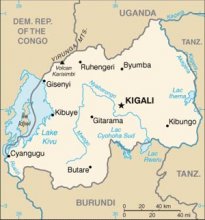Regional Background
Rwanda
Officially known as the Republic of Rwanda, is a country in central and eastern Africa with a population of approximately 11.4 million (2011). Rwanda is located a few degrees south of the Equator, and is bordered by Uganda, Tanzania, Burundi and the Democratic Republic of the Congo. All of Rwanda is at high altitude, with a geography dominated by mountains in the west, savannah in the east, and numerous lakes throughout the country. The climate is temperate, with two rainy seasons and two dry seasons every year.
The population is young and predominantly rural, with a density among the highest in Africa. Rwandans form three groups: the Hutu, Tutsi, and Twa. These groups share a common culture and language and are classified as social groups rather than tribes. Christianity is the largest religion in the country, and the principal language is Kinyarwanda, spoken by most Rwandans. Rwanda follows a presidential system of government. The President is Paul Kagame of the Rwandan Patriotic Front (RPF). The government receives electoral support from across the community, and corruption levels are low relative to other Sub-Saharan African countries, although human rights organisations allege suppression of opposition groups. Rwanda's economy suffered heavily during the 1994 Genocide, but has since strengthened. The economy is based mostly on subsistence agriculture. Coffee and tea are the major cash crops for export. Tourism is a fast-growing sector and is now the country's leading foreign exchange earner, the most popular activity being the tracking of mountain gorillas.
Kigali has a population 965,398 (2009), is the capital and largest city of Rwanda. It is situated near the geographic centre of the nation, and has been the economic, cultural, and transport hub of Rwanda since it became capital at independence in 1962. The city is coterminous with the province of Kigali City, which was enlarged in January 2006 as part of local government reorganisation in the country. The city's urban area covers about 70% of the municipal boundaries. Beginning on April 6, 1994, Kigali was the scene of the Rwandan Genocide — the slaughter of approximately one million Tutsi and moderate Hutu by Hutu militias (interahamwe), and some members of the Rwandan army — and of fierce fighting between the army (mostly Hutu) and Tutsi-dominated Rwandese Patriotic Front. Although damaged, the city's structure has recovered.





